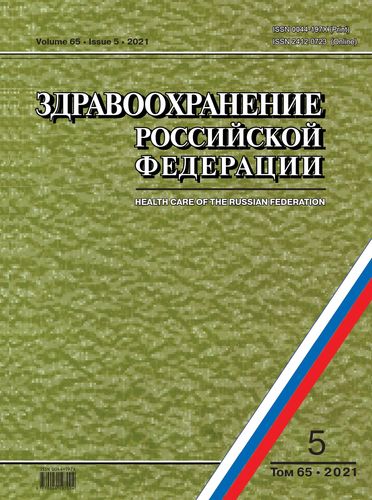Health information — relevance and accessibility (literature review)
- 作者: Pivovarova O.A.1, Kamynina N.N.1, Skulkina Y.N.1, Korotkova E.O.1
-
隶属关系:
- Research Institute for Healthcare Organization and Medical Management of Moscow Healthcare Department
- 期: 卷 65, 编号 5 (2021)
- 页面: 498-502
- 栏目: LITERATURE REVIEW
- ##submission.dateSubmitted##: 25.10.2024
- URL: https://hum-ecol.ru/0044-197X/article/view/638025
- DOI: https://doi.org/10.47470/0044-197X-2021-65-5-498-502
- ID: 638025
如何引用文章
全文:
详细
Introduction. Health literacy directly impacts global health, social indicators, family relationships, and individual health behaviour. A fundamental element of an effective health system is information for the population on the protection and management of their health and those for whom they are responsible. As an essential skill, medical literacy is necessary for searching, understanding, and analyzing medical data from various sources. Improving people’s health literacy is critical to achieving responsibility for health.
Aim. Analysis of the formation and impact of health literacy on the achievement of sustainable development and other health objectives.
Material and methods. Literature search methods included search queries on Web of Science, Scopus, MedLine, The Cochrane Library databases.
Results. Global access to essential health information is not reflected in official monitoring, indicating the need to improve access to health information to provide more effective care.
The availability and use of reliable health information depend on the integrity of the global health information system. A systemic approach to the problem demonstrates the vital contribution of a vast number and variety of «components”, including health research, publication and dissemination of such research, systematic reviews, Development of guidelines and many different secondary outputs for users.
Conclusion. Lack of access to health information is a social injustice that the world health community cannot afford to ignore. Access to essential health information is a prerequisite and a component of achieving universal health coverage.
作者简介
Oksana Pivovarova
Research Institute for Healthcare Organization and Medical Management of Moscow Healthcare Department
编辑信件的主要联系方式.
Email: pivovarovaoa1@zdrav.mos.ru
ORCID iD: 0000-0003-4234-1869
MD, PhD, DSci., Аcademic secretary of the Research Institute for Healthcare Organization and Medical Management of Moscow Healthcare Department, Moscow, 115088, Russian Federation.
e-mail: pivovarovaoa1@zdrav.mos.ru
俄罗斯联邦Natalia Kamynina
Research Institute for Healthcare Organization and Medical Management of Moscow Healthcare Department
Email: noemail@neicon.ru
ORCID iD: 0000-0002-0925-5822
俄罗斯联邦
Yulia Skulkina
Research Institute for Healthcare Organization and Medical Management of Moscow Healthcare Department
Email: noemail@neicon.ru
ORCID iD: 0000-0002-4917-578X
俄罗斯联邦
Ekaterina Korotkova
Research Institute for Healthcare Organization and Medical Management of Moscow Healthcare Department
Email: noemail@neicon.ru
ORCID iD: 0000-0001-5473-4796
俄罗斯联邦
参考
- World Health Organization and UNICEF. A vision for primary care in the 21st century: towards universal health coverage and the sustainable development goals. Geneva; 2018. Available at: https://www.who.int/docs/default-source/primary-health/vision.pdf
- Ghoncheh M., Pournamdar Z., Salehiniya H. Incidence and mortality and epidemiology of breast cancer in the world. Asian Pac. J. Cancer Prev. 2016; 17(S3): 43-6. https://doi.org/10.7314/apjcp.2016.17.s3.43
- Pakenham-Walsh N., Godlee F. Healthcare information for all. BMJ. 2020; 368: m759. https://doi.org/10.1136/bmj.m759
- Paakkari L., Inchley J., Schulz A., Weber M., Okan O. Addressing health literacy in schools in the WHO European region. Public Health Panorama. 2019; 5(2): 186-90. Available at: https://apps.who.int/iris/bitstream/handle/10665/327055/php-5-2-3-186-190-eng.pdf
- WHO. Shanghai declaration on promoting health in the 2030 Agenda for Sustainable Development. Health Promot. Int. 2017; 32(1): 7-8. https://doi.org/10.1093/heapro/daw103
- McDaid D. Investing in Health Literacy: What Do We Know About the Co-benefits to the Education Sector of Actions Targeted at Children and Young People. Policy Brief 19. Copenhagen; 2016.
- Colley P., Myer B., Seabrook J., Gilliland J. The impact of Canadian school food programs on children’s nutrition and health: A systematic review. Can. J. Diet. Pract. Res. 2019; 80(2): 79-86. https://doi.org/10.3148/cjdpr-2018-037
- Stephani V., Opoku D., Quentin W. A systematic review of randomized controlled trials of mHealth interventions against non-communicable diseases in developing countries. BMC Public Health. 2016; 16: 572. https://doi.org/10.1186/s12889-016-3226-3
- Müller A.M., Alley S., Schoeppe S., Vandelanotte C. The effectiveness of e- mHealth interventions to promote physical activity and healthy diets in developing countries: A systematic review. Int. J. Behav. Nutr. Phys. Act. 2016; 13(1): 109. https://doi.org/10.1186/s12966-016-0434-2
- Yadav S., Rawai G. The HIFA and the HealthPhone: laying the foundation for combating malnutrition in India. Int. J. Health Sci. Res. 2015; 5(7): 368-71.
- WHO. WHO Guideline: Recommendations on digital interventions for health system strengthening. Geneva; 2019. Available at: https://www.who.int/reproductivehealth/publications/digital-interventions-health-system-strengthening/en/
- Bröder J., Chang P., Kickbusch I., Levin-Zamir D., McElhinney E., Nutbeam D., et al. IUHPE position statement on health Literacy: A practical vision for a health literate world. Global Health Promot. 2018; 25(4): 79-88. https://doi.org/10.1177/1757975918814421
- Labrique A.B., Wadhwani C., Williams K.A., Lamptey P., Hesp C., Luk R., et al. Best practices in scaling digital health in low- and middle-income countries. Global Health. 2018; 14(1): 103. https://doi.org/10.1186/s12992-018-0424-z
补充文件








